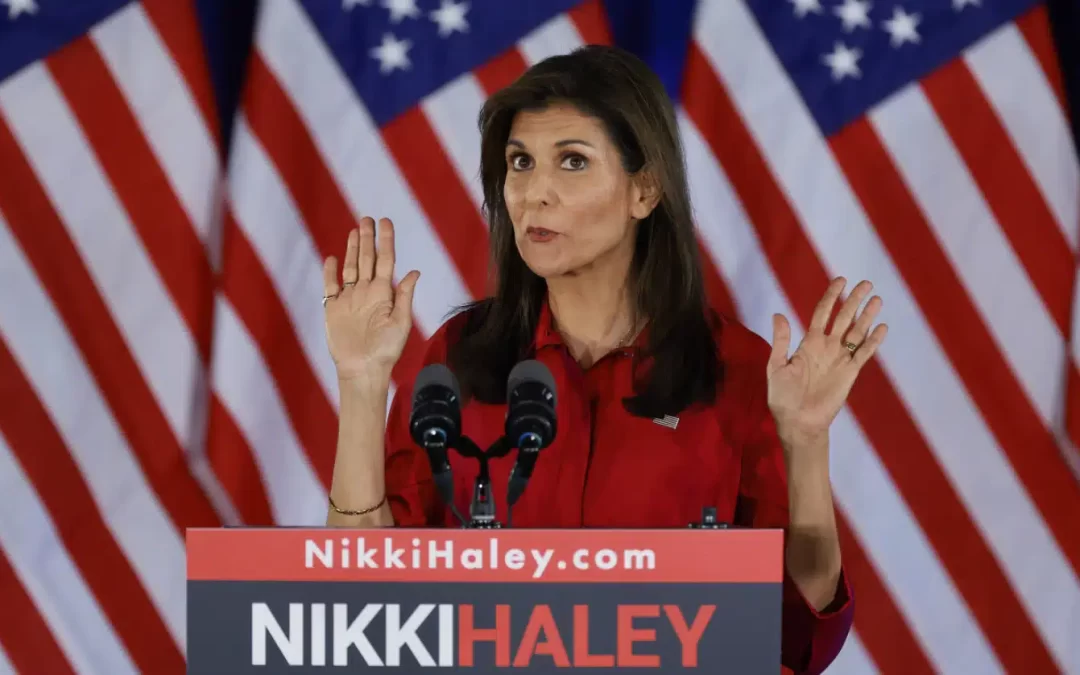Nikki Haley is refusing to drop out of the 2024 presidential race after former President Donald Trump’s decisive victory in New Hampshire on Tuesday night.
Haley spoke to supporters after the race was called and vowed to stay in the race until the end. Despite losing both Iowa and New Hampshire — while also trailing big in Nevada and South Carolina polls — Haley claimed she had a path forward.
Haley acknowledged her defeat, but was adamant that “we keep moving up.”
“I want to congratulate Donald Trump,” she said before knocking the “political class” for “saying this race is over.”
“With Donald Trump, Republicans have lost almost every competitive election. We lost the Senate. We lost the House. We lost the White House. We lost in 2018. We lost in 2020. And we lost in 2022,” Haley declared.
“The worst kept secret in politics is how badly the Democrats want to run against Donald Trump,” Haley claimed, adding, “a Trump nomination is a Biden win and a Kamala Harris president.”
“Our fight is not over because we have a country to save,” Haley stressed. “New Hampshire is first in the nation, it is not last in the nation. This race is far from over. There are dozens of states left to go. And the next one is my sweet state of South Carolina.”
She also noted she got “close to half of the vote.”

During a campaign event before Tuesday’s primary election in New Hampshire, Haley told a crowd in Seabrook that the Republican primary is now between herself and former President Donald Trump. Haley also vowed to stay in the race after the New Hampshire primary, which polling shows she will lose to Trump.
“We just heard that Ron DeSantis has dropped out the race. I want to say to Ron, he ran a great race. He’s been a good governor, and we wish him well. Having said that, it’s now one fella and one lady left!” Haley told the crowd.
Just days before the New Hampshire primary, DeSantis endorsed Trump and withdrew from the Republican presidential race in 2024. The Florida governor took to X, the social media platform formerly known as Twitter, and made the announcement.
“If there was anything I could do to produce a favorable outcome, more campaign stops, more interviews, I would do it. But I can’t ask our supporters to volunteer their time and donate their resources if we don’t have a clear path to victory. Accordingly, I am today suspending my campaign,” said DeSantis, who was a distant third in the single digits in the latest polls in New Hampshire.
“It’s clear to me that a majority of Republican primary voters want to give Donald Trump another chance. They watched his presidency get stymied by relentless resistance, and they see Democrats using lawfare this day to attack him. I signed a pledge to support the Republican nominee, and I will honor that pledge,” DeSantis added.
Recent CNN polling out of the University of New Hampshire suggests that former President Donald Trump has a commanding lead in the New Hampshire Republican presidential primary, building on his decisive 30-point victory in last week’s Iowa caucuses.
Among Granite Staters who are likely to vote in the Republican primary, Trump has 50% support, with former South Carolina governor Nikki Haley trailing in second place with 39%. Since the last CNN/UNH poll in early January, when Trump had 39% of the vote and Haley had 32%, both candidates have gained support due to the reduction in the number of major contenders.
According to UNH polling on the race, both Trump and Haley now have their highest level of support. Despite Haley’s impressive gains since the end of last summer, the gap between her and Trump has widened to double digits once again.
Among the early primary states, Trump’s opponents have long seen New Hampshire as their best bet to derail his pursuit of a third consecutive Republican presidential nomination. In this early state, voters were often the most receptive to Trump’s opponents, and polls consistently showed that he did not have majority support.
However, the most recent poll indicates that Trump’s support and popularity among Republicans far exceed those of his opponents.
In the Republican primary, Haley has 71% support from moderates and 58% from undeclared voters (New Hampshire’s word for independents) who intend to cast a ballot. Voters with bachelor’s degrees are more likely to support Haley than Trump (38% vs. 50%).
However, when considered separately, these demographics only account for a small fraction of New Hampshire’s likely GOP primary voters: 47% are undeclared, 33% have a bachelor’s degree or above, and approximately 30% consider themselves moderates.
The more powerful opposing factions within each of those groups have largely rallied behind Trump. He has the support of 67% of Republican registration, 71% of conservatives, and 55% of the non-degreed population.
Even more striking is the fact that 88% of Trump’s supporters are dead set on supporting him, while only 74% of Haley’s supporters are in a comparable state of mind. That works out to 45% of voters strongly supporting Trump, compared to 30% who are on the fence about Haley.
About one-fifth of likely Republican primary voters overall still haven’t decided who to vote for, even though Tuesday’s primary is just around the corner. Currently, 51% of that group is on Haley’s side, 28% are on Trump’s, and 14% are on DeSantis.
New Hampshire Republican primary voters generally believe that Trump will win on Tuesday (70% believe he will carry the day, compared to 36% of Haley supporters).
Plus, more people would be happy with Trump as the party’s presidential nominee than with Haley or DeSantis (61% say they would be enthusiastic or satisfied if Trump won the nomination, compared to 54% for Haley and DeSantis, respectively).
Still, among primary voters, Trump maintains a higher favorable rating than Haley or DeSantis: 56% have a positive impression of Trump, compared to 36% for Haley and 28% for DeSantis.
Unlike Haley, who finishes the campaign in negative territory, he is the sole remaining candidate who has maintained a net positive favorability rating throughout the past year.
The Republican primary voters in the state also had a generally positive impression of Trump’s performance in office.
Of those who are likely to vote for him in the Republican primary, 70% believe that he had a net positive impact on the country during his first term in office, 28% say the opposite, and 2% say he had no effect at all.









